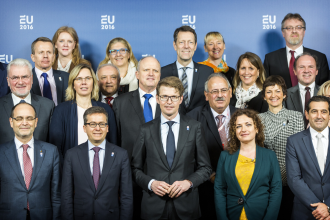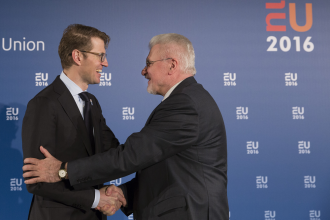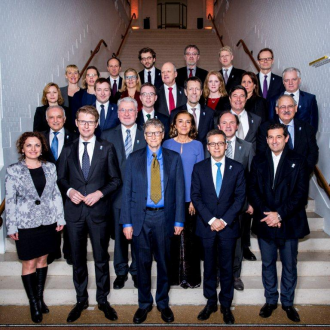Special guest to the event was renowned technology pioneer and businessman Bill Gates who shared his thoughts with the ministers on the eve of the meeting.
The dialogue of research ministers started at an informal dinner where Bill Gates delivered a speech, praising the cultural traditions and major research potential of the EU while pointing out the associated global responsibility. He also emphasized the vital importance of funding researches that provide solutions to economic and social challenges and highlighted the special significance of public resources in areas where the private sector is playing a less active part. Key topics of next day's meeting included the evaluation of the FP7 Framework Programme closed in 2013 and the creation of a European regulatory environment attractive to innovators. The event was hosted by Dutch State Secretary for Education, Culture and Science, Sander Dekker who invited renowned professionals such as Catherine Mann, OECD Chief Economist and Mehmood Khan, Executive Vice President and Chief Scientific Officer, Global Research and Development at PepsiCo to set the scene for the debates.
 |
 |
An ex-post-evaluation report on the FP7 Framework Programme for Research and Technological Development was presented by a group of international experts. The FP7 Programme ran from 2007 to 2013 with an extended budget of EUR 55 billion. In total, 139,000 proposals were submitted to FP7 calls for proposals from which 25,000 projects were funded. Hungarian universities, research places and businesses won a total of EUR 287 million, representing 0.6 percent of the total budget. It puts us in the middle rank of 28 EU member states, in the 16th place, but in the pack of countries that joined the EU in 2004 Hungary was the second most successful following Poland. A special publication was made for the occasion to illustrate the tangible results of FP7, introducing as an example a funded R&D project from each member state. The Hungarian example is an excellent research conducted by systems biologist Csaba Pál and his team. The research involves a group of scientists at the Biological Research Center, Hungarian Academy of Sciences in Szeged studying unicellular yeast fungi to detect bacterial genes that, when switched off, can slow down the development of resistance by pathogens to medicines.
Speaking about the Hungarian results József Pálinkás gave a brief overview of the organizational and conceptual restructuring of Hungary’s R&D funding system, highlighting that from the perspective of Hungary the creation of the European Research Council (ERC) was a major novelty of the framework programme. “In the history of the framework programmes this institution was the first to embrace the risk of providing long-term funding to frontline research projects that are based on individual excellence. With EUR 60 million funding won from the ERC, the performance of Hungarian applicants outshine that of the applicants from the EU13 as we even succeeded to surpass some of the older member states. In Hungary, ERC-funded projects serve as a model of excellence for researchers, and therefore the country provides bridging funding to applicants who were positively evaluated but failed to receive funding to encourage them to re-enter the competition", the President of the NRDI Office explained.
With regard to an innovation-friendly regulatory environment attendees agreed that Europe needs talented entrepreneurs, and in particular startup founders, since OECD statistics show that these young firms account for 17 percent of total employment and 42 percent of new jobs. The research and development activities of startups could be boosted by a simplified EU regulation involving reduced administration burdens and a consistent, predictable framework. It could further benefit from the introduction of new concepts such as the so-called “Innovation Deals” designed to support, on European and national levels, new firms that have a minor market share or ideas that have not yet been commercialized but potentially have a wide range of applications.
Attraction and retention of startup founders from outside the EU could also largely improve Pan-European competitiveness. To date, eight member states have introduced measures to encourage the “settling” of these innovators. Still, the European Union as a whole is less attractive in this regard because the diversity of regulations and forms of support hinders mobility within the EU. The European start-up visa recommended by the Dutch Presidency would support consistent treatment of startup founders from outside the EU by creating more positive conditions and thereby opening Europe's true market potential to innovative firms. According to PepsiCo Vice President Mehmood Khan, the potential of Europe lies in its talented researchers and expertise in technology. He also mentioned a specific example: the by-product of freshly pressed orange juice is utilized in many ways worldwide, but it has been meeting obstacles in Europe for many years because of the inflexibility of the legislation.
 |
 |
 |
|






